- Dec 18, 2013
- 136,602
- 27,968
- 2,180
Sure I do foolHere is the problem right here
To stand and argue at bay about what you know are lies, is sanctimonious.
You know so such thing. What does that make YOUR statement?
Follow along with the video below to see how to install our site as a web app on your home screen.

Note: This feature currently requires accessing the site using the built-in Safari browser.
Sure I do foolHere is the problem right here
To stand and argue at bay about what you know are lies, is sanctimonious.
You know so such thing. What does that make YOUR statement?
Calling bullshit on you, Ian. We do have that technology and are implementing it as we post. Wind is already cheaper than coal, even without considering the externalities of the fossil fuels. Solar will soon be, and the grid scale batteries will make both of these 24/7.Ian, let's say they're right, what is their next step? more money? For what? I'm ok with lstening, but damn present something other than oh we're doomed.And how much differance does that make in insolation in January? Compared to June? How much differance between the reflective snow over 13 km^2 compared to 6 km^2. That is 7 km^2 more dark earth absorbing sunlight, rather than having the sunlights energy reflected near the time of maximum sunlight. Energy balance is what it is all about. And that dark earth is permafrost loaded with CO2 and CH4.
here we go again. more scary graphs.
what does it look like in context?
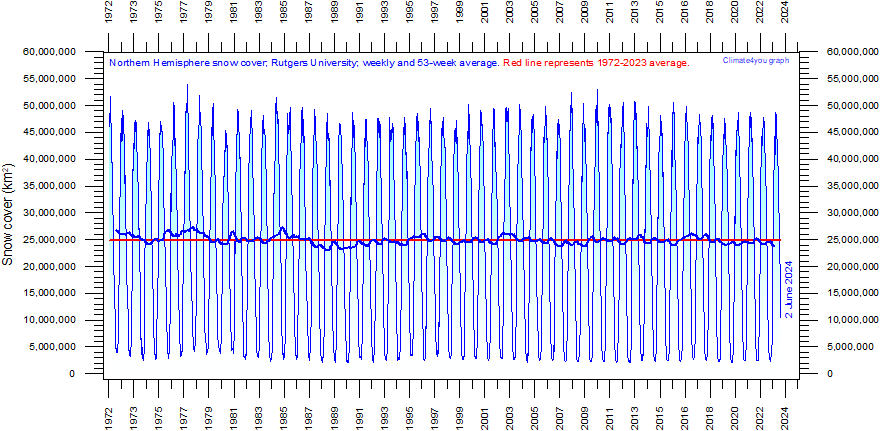
starting in 67 rather than 72 includes years with missing data but i'll show that too.
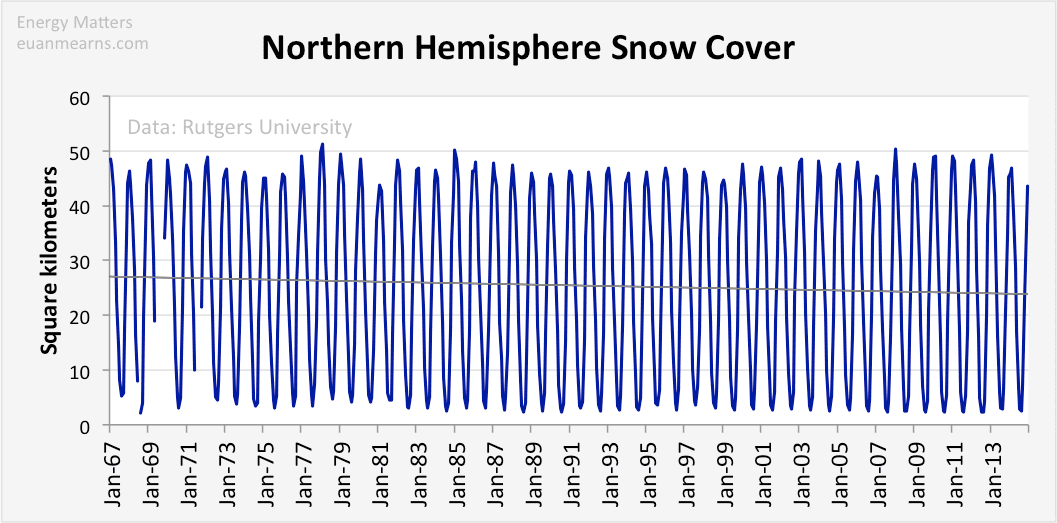
spring is from late march to late june-
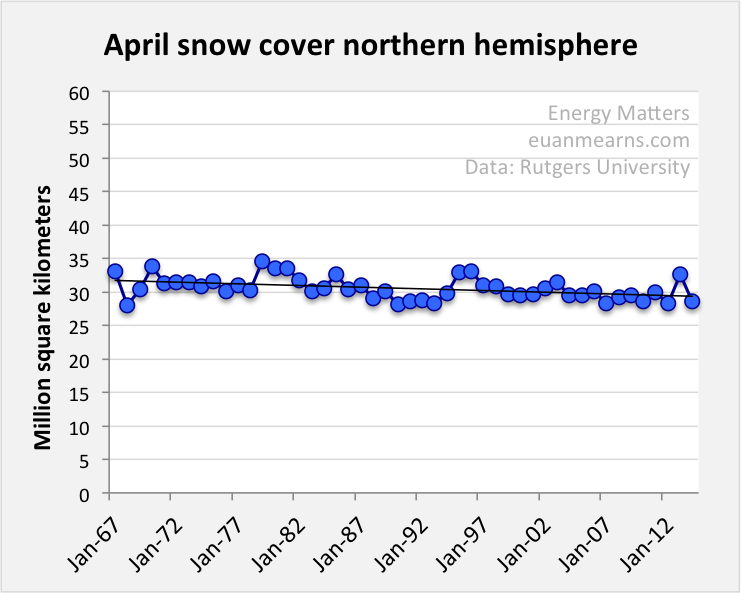
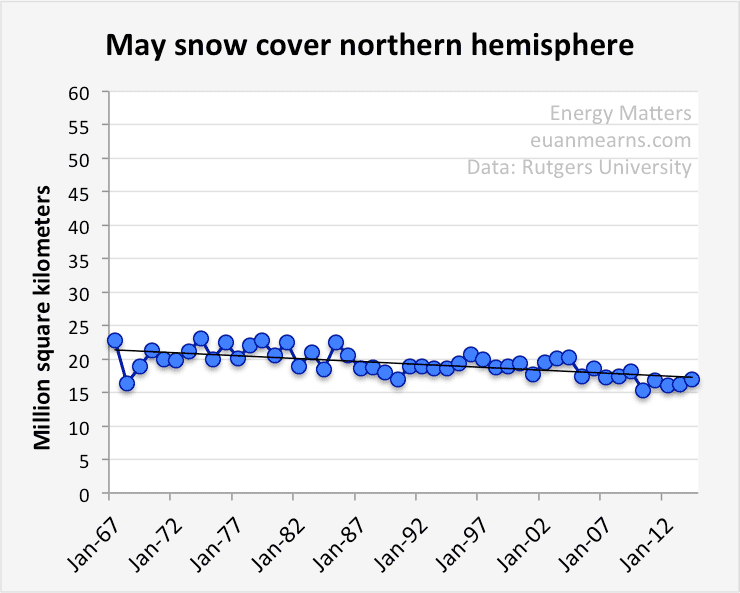
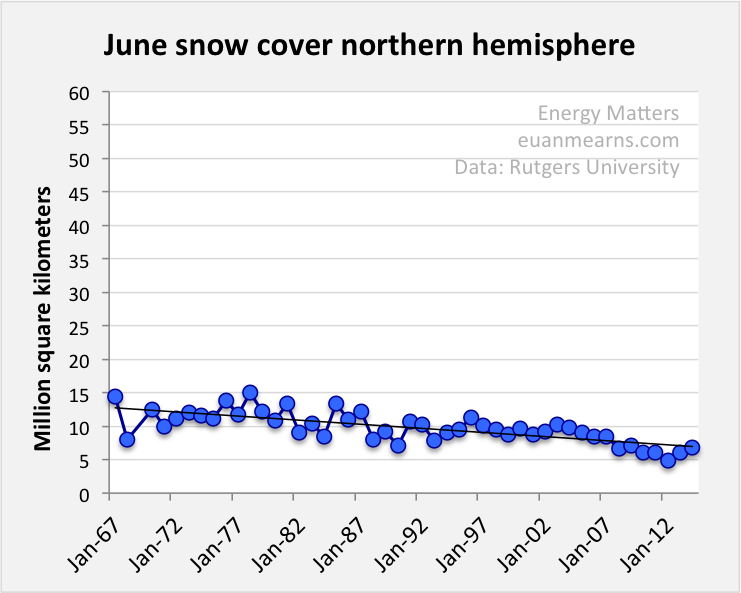
it looks like spring is down 12M km^2, and the rest of the year is up 10M. even smaller change if you only use years with full coverage. I finding it hard to get scared over that.
That is a fair enough question. It does make a difference. Albedo is reduced, more things grow etc.
But that begs the question of when the clathrates and peat were set down. And why everything didn't 'let go' during the MWP, RWP, or any of the other warm periods. You keep making predictions of doom but you fail to realize that they should already have happened! Perhaps if this present warm period continues for hundreds or thousands of years we will move into unprecedented conditions but we are certainly not there yet. Not much farming going on in Greenland this year, eh?
You are too gullible when it comes to all these worst case scenarios. I cannot say for certain that disaster is impossible, just that it is very unlikely. And this is the crux of the matter. It is easy for climate science to admit to the farfetched predictions of doom because there is no penalty to be paid, instead there are rewards by more funding. On the other hand if they pointed out the low probability of disaster they would also be putting themselves out of a job. Rewards for alarmism, penalty for pragmatism. It is easily understandable how we got to this position, it is hard to see how we can get back to to a more realistic view.
I don't know. It is like asking if we should spend a couple of hundred trillion dollars on the capability to deflect an asteroid from hitting the Earth. If we knew it was coming then it's worth it. And we would either succeed or fail.
Global warming is an unknown risk that is heavily biased towards pointing out the negatives and ignoring the positives. Mitigation of possible problems is easier and cheaper than prevention. And we don't even have the realistic technology for prevention.
Calling bullshit on you, Ian. We do have that technology and are implementing it as we post. Wind is already cheaper than coal, even without considering the externalities of the fossil fuels. Solar will soon be, and the grid scale batteries will make both of these 24/7.Ian, let's say they're right, what is their next step? more money? For what? I'm ok with lstening, but damn present something other than oh we're doomed.And how much differance does that make in insolation in January? Compared to June? How much differance between the reflective snow over 13 km^2 compared to 6 km^2. That is 7 km^2 more dark earth absorbing sunlight, rather than having the sunlights energy reflected near the time of maximum sunlight. Energy balance is what it is all about. And that dark earth is permafrost loaded with CO2 and CH4.here we go again. more scary graphs.
what does it look like in context?

starting in 67 rather than 72 includes years with missing data but i'll show that too.

spring is from late march to late june-



it looks like spring is down 12M km^2, and the rest of the year is up 10M. even smaller change if you only use years with full coverage. I finding it hard to get scared over that.
That is a fair enough question. It does make a difference. Albedo is reduced, more things grow etc.
But that begs the question of when the clathrates and peat were set down. And why everything didn't 'let go' during the MWP, RWP, or any of the other warm periods. You keep making predictions of doom but you fail to realize that they should already have happened! Perhaps if this present warm period continues for hundreds or thousands of years we will move into unprecedented conditions but we are certainly not there yet. Not much farming going on in Greenland this year, eh?
You are too gullible when it comes to all these worst case scenarios. I cannot say for certain that disaster is impossible, just that it is very unlikely. And this is the crux of the matter. It is easy for climate science to admit to the farfetched predictions of doom because there is no penalty to be paid, instead there are rewards by more funding. On the other hand if they pointed out the low probability of disaster they would also be putting themselves out of a job. Rewards for alarmism, penalty for pragmatism. It is easily understandable how we got to this position, it is hard to see how we can get back to to a more realistic view.
I don't know. It is like asking if we should spend a couple of hundred trillion dollars on the capability to deflect an asteroid from hitting the Earth. If we knew it was coming then it's worth it. And we would either succeed or fail.
Global warming is an unknown risk that is heavily biased towards pointing out the negatives and ignoring the positives. Mitigation of possible problems is easier and cheaper than prevention. And we don't even have the realistic technology for prevention.
At present, I see no positives to the rapid warming we are seeing. And many of the risks are very well known. The amount of arable land lost for each foot of increased sea level rise is known. The damage for each foot of rise to our seaports is a known factor. Increased variability damages our agriculture at a time we have over 7 billion mouths to feed.
The important thing is to remember none of these Leftytoon tree huggers have ever been to the arctic much less out of their basements. I have. They just copy and paste shit on the internets.The important thing is to not give a fuck. Which is the natural stance for most humans to have about the world.
Fuck it. God will handle things right?
Important thing to remember is that people like Politico pull statements out of their ass without any evidence for them at all. Yes, I have been to the Arctic.The important thing is to remember none of these Leftytoon tree huggers have ever been to the arctic much less out of their basements. I have. They just copy and paste shit on the internets.The important thing is to not give a fuck. Which is the natural stance for most humans to have about the world.
Fuck it. God will handle things right?
Sure you have. Show us the pictures.Important thing to remember is that people like Politico pull statements out of their ass without any evidence for them at all. Yes, I have been to the Arctic.The important thing is to remember none of these Leftytoon tree huggers have ever been to the arctic much less out of their basements. I have. They just copy and paste shit on the internets.The important thing is to not give a fuck. Which is the natural stance for most humans to have about the world.
Fuck it. God will handle things right?
Seems like God created Mother Nature and she's bad to the bone................and has been throwing people like you for a loop for a long time.....................
Riddle me this....................does plant life grow quicker and larger with higher levels of CO2..........................
to which you have never provided any proof exists.Seems like God created Mother Nature and she's bad to the bone................and has been throwing people like you for a loop for a long time.....................
Riddle me this....................does plant life grow quicker and larger with higher levels of CO2..........................
It is accepted by all that increased CO2 will cause increased growth in many plant species. The question is whether or not that outweighs the other, somewhat less desirable effects.
so the snow is melting normal, thanks for all the fluff,Present conditions in the arctic ...
The land-based snow is still melting out way ahead of the normal schedule
Rutgers University Climate Lab Global Snow Lab
A big cyclone over the north pole is winding down now. In 2013, the jet stream kept warm air away from the arctic, so the constant cyclones kept things very cold. This year, there was plenty of nearby warm air for cyclones to tap into, so the cyclones never got cold. Still, it blocked sunlight, so there's some effect. But it did also blow a lot of ice out the Fram Strait, where the current eventually takes it into the Atlantic to melt.
A Greenland high has been keeping Greenland cool, but will keep blowing ice out for the next 5 days. Alaska cools is cool again, but the Canadian islands and Siberia warm up.
Sea ice levels, still below 2 sigma, but about to cross above the 2012 line. So, the forecast is still for a bigger melt this year than 2013 and 2014, but not as big as the record low of 2012.
why? there isn't any sea rise coming or are you still under the impression that the sea ice can cause sea rise? What say you?Once again, just crazy demonstrates his stupidity. Yep. Snow melts, but the timing of that melt is critical. Just ask the people on the West Coast.
aka you don't know how much is compensated or not.............thanks for playing.Seems like God created Mother Nature and she's bad to the bone................and has been throwing people like you for a loop for a long time.....................
Riddle me this....................does plant life grow quicker and larger with higher levels of CO2..........................
It is accepted by all that increased CO2 will cause increased growth in many plant species. The question is whether or not that outweighs the other, somewhat less desirable effects.
aka you don't know how much is compensated or not.............thanks for playing.Seems like God created Mother Nature and she's bad to the bone................and has been throwing people like you for a loop for a long time.....................
Riddle me this....................does plant life grow quicker and larger with higher levels of CO2..........................
It is accepted by all that increased CO2 will cause increased growth in many plant species. The question is whether or not that outweighs the other, somewhat less desirable effects.
